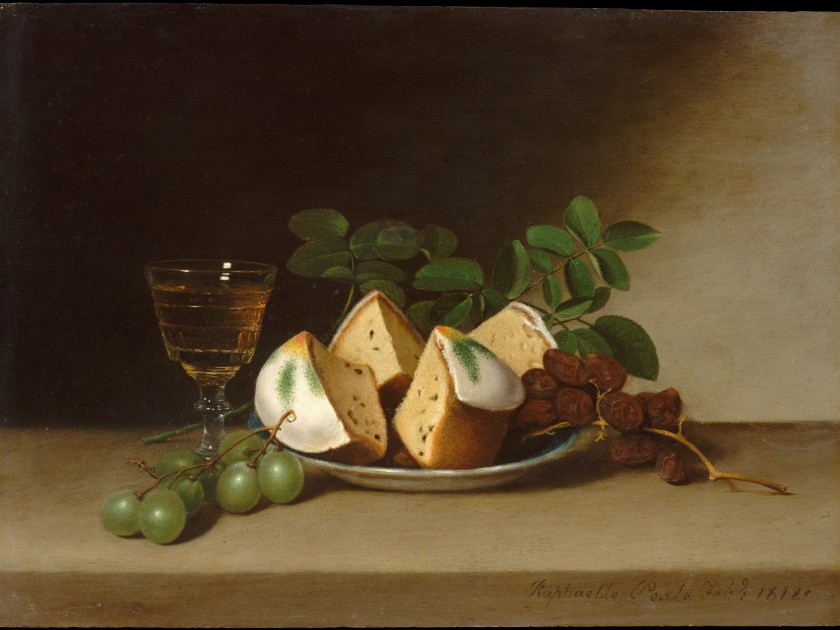
Still Life with Cake, Raphaelle Peale, 1818
Maria DeWitt Jesup Fund, 1959
When I attended yeshiva at the Pardes Institute for Jewish Studies it was for one reason, and one reason only: I was an advice columnist, Ask Your Yenta, writing about sex and dating and I had no idea about what Judaism had to say on the topic. I spent a difficult and amazing year neck-deep in Jewish text study, and emerged with knowledge of niddah (ritual sexual rules dictated by menstruation), tum-tum (an often-referenced third category of sex and gender that appears in Talmud), mikvah (a ritual cleanse often in preparation for sex), and a thirst for so much more information. When I went on to get a Master’s in Jewish Studies the following year it was with one singular focus: sex and gender in Judaism.
And a full decade later in 2019, when my father grew ill and passed away suddenly, I once again found myself searching for something I didn’t have: a guide to grieving. I knew Jewish ideas about covering mirrors, sitting low, feeding mourners, saying kaddish, and so much more; in fact, in a short period where I believed I would become a rabbi I took courses on death and dying at the Academy for Jewish Religion in Los Angeles. I knew a lot then about burial, emptying vessels when someone dies, opening windows, and cleaning bodies.
But I really wanted this other guide, one on how to grieve; how to know what to expect when expecting death, not life; how to ask for help; how to date when miserable and wading through loss; how to recognize and remedy trauma and PTSD; how to set boundaries; how to prepare for after-death paperwork. Oh, the list of what I didn’t know, wanted to know, and wished someone would tell me was very long. And I knew that not having a partner, I was navigating death and loss just a bit differently than others when losing a parent at my age.
Forget Prayers, Bring Cake: A Single Woman’s Guide to Grieving is the guide I longed for as I entered the physical mayhem, emotional storms, deep profundity, and life altering terrain of parental loss. While writing, I tried to make it a secular book. I worked at first to avoid any mention of Judaism and its many branches that at times guided my experience.
Beginning the day my father died, my year to follow was marked by Jewish time, punctuated by eleven months to grieve, and many failed attempts at communal kaddish during a pandemic.
On a call with my editor two months before the book was due he asked me, a bit frustrated and rightfully so, “Where is the rest of the book?” I was sheepish and I was strange. I dodged the question, played baby, didn’t want to fess up.
And finally I confessed: “I was once told Jewish doesn’t sell. I cut all the Jewish out of the book.” My editor was amazing in that moment; he was firm, kind, and sincere. He said, “Well, Merissa. You already sold this book to a publisher. Now write your story, your Jewish story.” And I did.
The vacant second half of the book was my yeshiva time with grief. It was a time of filling in all the terms I had learned, like when Rabbi Jill Hammer explained the vital importance of aninut—of worrying about nothing but feeling through the abyss of nothingness in the days between watching my father die and then burying him. Or when I was taught about shloshim, something I was grateful for, thirty days to temper my mourning. Rabbi Aaron Alexander showed up for the closing of shiva and a solemn walk about the neighborhood marked my family, as grievers, symbolically re-emerging into the world.
Beginning the day my father died, my year to follow was marked by Jewish time, punctuated by eleven months to grieve, and many failed attempts at communal kaddish during a pandemic. My year became one of Jewish innovations, Zoom rituals, creative acts of mourning and marking memory, and so much solitude. Suddenly, the emergence of the second half of my book, and the narratives therein, became the book I needed so badly when in that unknown time. These narratives became a Jewish testament to what mourning can look — and doesn’t always look like — with the inheritance of Jewish ritual tradition.
It turns out sex and death are quite intimately linked. It makes sense that I spent the beginning of my literary pursuits in deep hunger for an understanding of how to bridge ancient and very religious sexual laws into the modern. This is the life force. The profound unknown that drives creative regeneration. So, too, is this book a bridge from the ancient and strict rituals around death and mourning, that lit my way as I navigated my own loss, to the modern, the ritualistic, the collective, and the private ways in which we all must honor ourselves, our dead, our living, and all the joy to come.
Merissa Nathan Gerson’s writing appears in The New York Times, The Atlantic, Playboy, Tablet, Lilith, and beyond. She was the inherited trauma consultant to Amazon’s Emmy-winning show Transparent and the author of “Ask Your Yenta,” an advice column syndicated by The Jewish Journal. The founder of KenMeansYes.org, a consent advocacy organization, Merissa speaks nationwide on inherited trauma, consent education, and Jewish sex education.